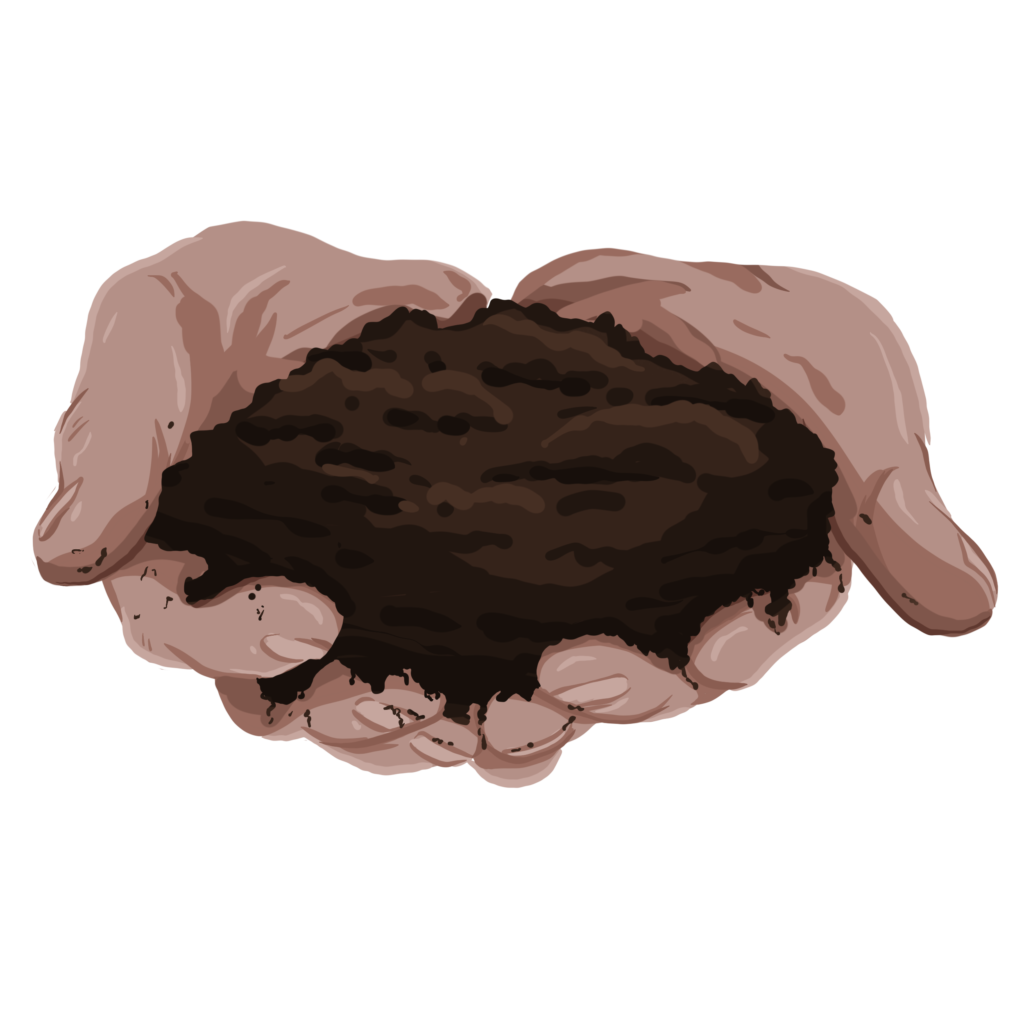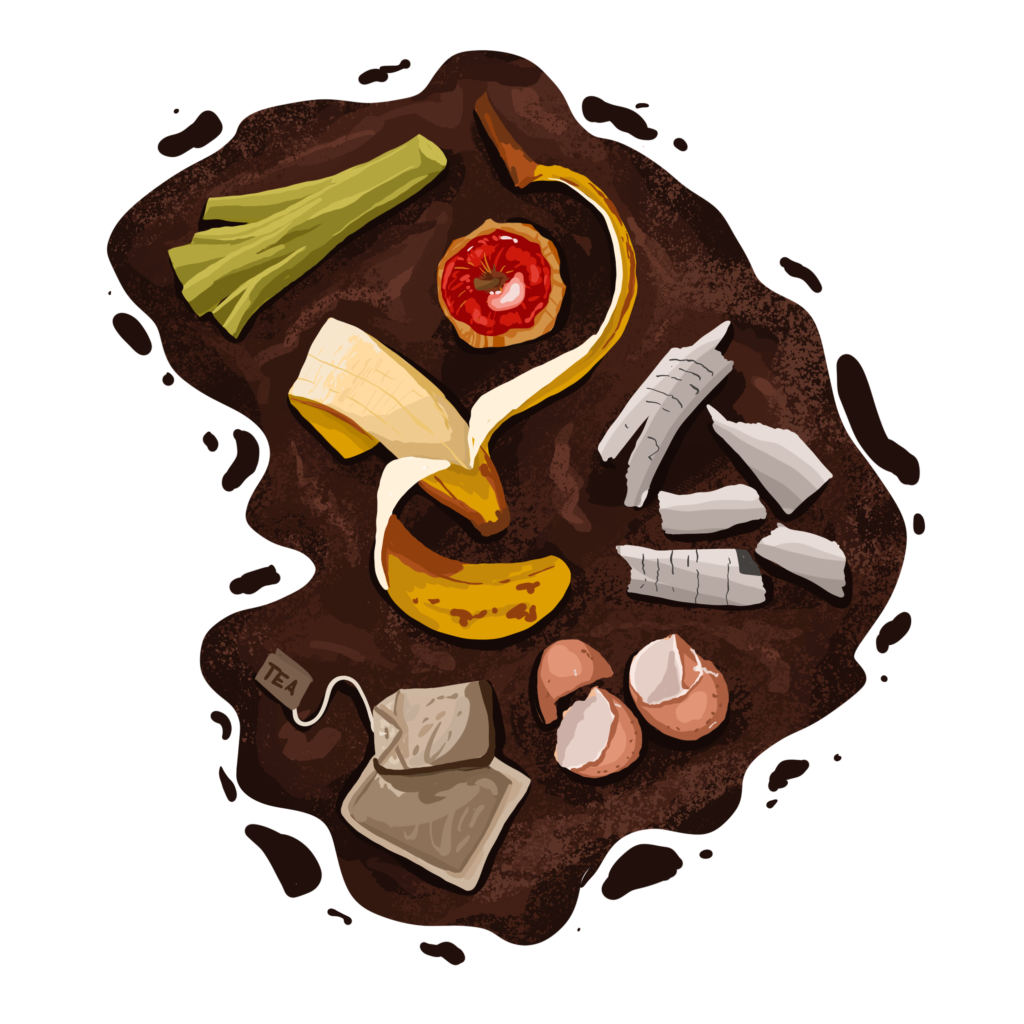
Do you want to do your part in reducing food waste, but don’t know where to start? These tips on composting will make it easier to get started.
Composting is a great way to reduce the amount of food waste you produce, and it’s easier than you might think! In this blog post, we will share our favorite tips that will make it easy for you to get started. We will also cover information on the benefits of composting and how to avoid common pitfalls.
What Is Composting?

Illustration by Krysten Bevilaqua
Composting is a process that turns organic material into a soil-like substance.
You can use many different types of organic materials to create compost. This includes food waste, yard waste, and paper products. When composted correctly, these materials will break down and create a nutrient-rich soil amendment that can be used to improve the quality of soil in gardens and landscapes.
How Composting Helps the Planet
Composting is one of the simplest ways to reduce your environmental impact. By composting, you can divert organic waste from landfills and incinerators, where it takes up valuable space and creates harmful emissions.
Every bit of food waste produces a dramatic amount of climate-worsening pollution, especially in landfills. Composting prevents around 7.5 pounds of greenhouse gas emissions for every pound of food scraps, including methane and carbon pollution.
In fact, the benefits extend way beyond the planet. Composting is so beneficial that it’s been estimated that if everyone in the United States composted their food waste, we could save over $100 million in landfill fees every year!

Tips on Composting
Now that you know all about the benefits of composting, let’s get started with some tips on composting to make the process easy for you.
Composting Tip #1
Pick a compost method that fits your lifestyle best. There are many different ways to compost, and each has its own set of benefits and drawbacks.
The most important thing is to pick a composting method that will fit into your lifestyle and schedule. Some common composting methods include in-vessel composting (i.e. tumblers or bins), vermicomposting (worms are amazing!), hot composting, and cold composting. For the lucky among us, there are also local compost pick-up services you can sign up for.
Composting Tip # 2
If you can’t decide which composting method to use, try finding a nearby composter. Share Waste is a platform that allows you to find neighbors or others nearby that compost and are willing to accept others’ compostables.
It’s a great option for you to get into the habit of collecting your waste daily. Plus, once you decide which permanent method is the best fit, it will make it feel even easier to continue.
Composting Tip # 3

We can’t miss one of the most important tips on composting: to avoid smells, pay attention to your browns and greens.
The two main ingredients in compost are browns and greens. Browns are the carbon-rich materials, like newspapers, dryer lint, and dried leaves, that help to break down the organic matter in your compost pile. Greens are nitrogen-rich materials, such as food scraps and grass clippings, that help to speed up the process.
A good mix of browns and greens is key for creating a healthy compost pile. Each time you add greens, try to add equal amount of browns.
Now let’s find the perfect indoor food scrap collection system that won’t smell or attract flies!
Composting Tip # 4
If you have the counter space, a composting crock is a great option. We like this list of attractive options that include carbon filters to prevent offending odors from sneaking out.
Composting Tip # 5
If you have the fridge or freezer space, we recommend finding a container you can fit there. Cooler temps prevent flies and odors. We love this option you can find at Earth Hero’s shop that can also simplify wiping scraps off the counter into the bin!
Composting Tip #6
Another way to prevent odors is to put a layer of newspaper at the bottom of your food scrap collection container. We have also heard people have some success with cutting (non-plastic) wine corks length-wise to reduce moisture as well.
The habit of composting
Because we are obsessed with applying behavior change to climate habits, let’s break down and tackle some of the common speed bumps to feeling like composting is a nearly effortless habit.
- Make it easy to collect food scraps. Keep a collection container visible and easily accessible. This helps you both remember to add your food scraps to a collection container and reduces friction to do so.
- Try to stack taking out food scraps to other regular habits. Whether adding it to when you head out the door each morning or when you also take out the garbage, adding a new step to an existing habit makes it easier to add to your routine.
- Figure out a way to track the days you’ve taken out the compost. A checkmark or “C” on each calendar day, or just a running tally on your fridge, whatever works best for you! Every time we check off a tiny goal a small amount of dopamine is released in our brains, providing an instant boost. Celebrating those tiny steps also helps counter frustration on days you forget (it will happen!).